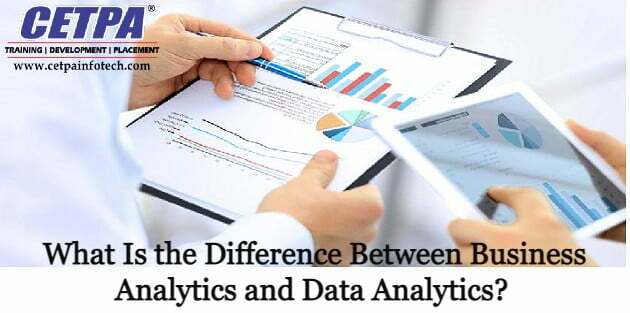What Is the Difference Between Business Analytics and Data Analytics?

Introduction
Did you know that analytics is now the driving force for business development and transformation? Precisely because of that fact that it has been enabling organizations to create and implement new strategies. These creative and advanced strategies work towards enhancing customer experiences, improving growth opportunities, as well as providing additional revenue streams.
However, analytics, as a term, is used so often that it has become exceptionally hard to determine its purpose and application. For instance, data analytics and business analytics are often used interchangeably even though these two differ from each other drastically.
It is true that both business analytics and data analytics are used to analyze data, improve it and make it more competitive. But the fact remains, these two differ from each other, even though many people consider them to resolve the same issues. In this article, we will explore Data Analytics, Business Analytics and how they differ from each other.
But one thing is certain, both business analytics and data analytics are high in demand and provide lucrative opportunities. Hence, choosing an online business analytics course or data analytics training is going to benefit you in the long run.
Let’s start alphabetically,
What is Business Analytics?
Business Analytics predominantly focuses on applying statistical analysis methods to provide information that leads to improvement in financial performance while promoting innovation. Big data is often regarded as an asset for analytics-driven companies. Business analytics is like the goldmine of insights. This is so because it is this data that helps in business decisions, planning future strategies etc.
Furthermore, there are chiefly three types of business analytics- descriptive, predictive as well as prescriptive. These three are often employed together to resolve issues that arise in the data. Descriptive analytics assess the history of data to gather information about the future.
Predictive analytics use machine learning algorithms as well as statistical methods to predict future events. Prescriptive analytics is a mix of both as it evaluates possible actions to take based on the results of analysis done by the first two.
What is Data Analytics?
Data analytics is essentially the process of analyzing and categorizing data. This includes storing, cleansing, sorting, identifying patterns, and expounding insights. Data analytics uses various statistical techniques, big data processing, as well as advanced technology to come to these conclusions.
Data analytics enables the organization to improve efficiency and effectiveness in day-to-day operations. It also helps in developing strategies to seek new business opportunities. To do so, it requires tools and programming languages like Tableau and Python.
Also Read: What Are The Skills Required For Data Analytics Professional
So What is the Difference between Business Analytics and Data Analytics?
● Business Analytics emphasizes on pointing out trends in the organization which can be optimized in order to speed up the overall performance of the business as well as enhance planning. Moreover, in business analytics, improvement in technology happens continually.
● Whereas, in Data Analytics, the focus is on recognizing trends in data to make accurate predictions about the futures
● Business analytics involves defining the goals as well as requirements for various projects and tasks. The approach that business analytics take is more descriptive and retrospective. In data analytics, specific questions are answered and new insights are
discovered to provide the organization a competitive edge. It is more predictive and prescriptive than business analytics.
● In business analytics, data sources are established before the project begins and these sources are based on the project goals. However, in data analytics, analysis is impromptu and data sources are added as per convenience and requirements.
● Data analytics include roles like business manager and data analysts, whereas business analytics include roles like analytics manager, business analysts, CIO, CDO, and data warehouse engineer.
● The end goal of both of these roles is the same. However, a business analyst covers aspects like implementing changes and providing eventual results instead of processing data and coming to conclusions. When it comes to data analysts, they have to emphasize on programming, data processing, and statistics.
● The role of a business analyst is to ensure that more practical changes are made while focusing on people. So, a business analyst needs to work closely with people in various departments. Whereas, data analysts tend to work on their own, independently.
I hope this helps,
Have a great day!



